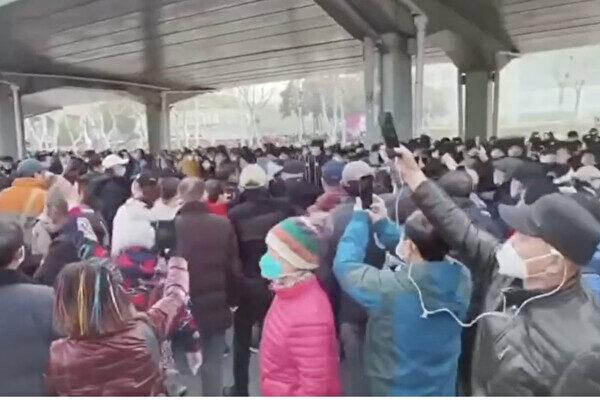Elderly protestors in Wuhan, China have been threatened and harassed by the police there since Feb. 8, when tens of thousands of Wuhan’s retirees started huge protests against health reforms that cut their medical benefits by 70 percent.
Authorities’ Retaliation
In a previous report, local residents revealed to The Epoch Times that Wuhan mobilized nearly all of its police forces when a large protest took place there on Feb. 15. Since then, the police have engaged in an all-out effort to retaliate against and punish the participants.In early March, local police summoned Hao for interrogation. They demanded to check his cell phone, but he rejected their request.
Hao indicated that the police keep a detailed record of almost every protestor, and monitor their chat content and their Weixin—a Chinese-based social media platform. The police and community grid staff have pursued him every day, Hao said, just to “confirm” his whereabouts.
“The majority of the participants have been summoned to the police station for a statement. [We] have all been warned,” said Hao. He believes the authorities will continue the monitoring and checking just to prevent more protests from arising.

A Plundering Reform
“This medical insurance reform is plundering,” said Wuhan retiree Liang Li (pseudonym), who’s in her late 60s.The steep cut of the health benefit left her only 160 yuan ($23.25) per month as a benefit, while she still has a hospitalization bill of more than 5,000 yuan ($726.41) to pay after her Covid infection. It will now take her several years to save up the money, she said.
Gu Guoping, a retired teacher in Shanghai, said, “What we, the elderly desire is a sense of security in old age. The Wuhan elderly are doing what they should do. I agreed with their rally.
“Retirement pensions and medical insurance are personal assets,“ he said. ”It is my labor remuneration, not the state’s welfare—nor is it given by the [Communist] Party.”
Gu said when the government slashed the personal account payments, it was violating their rights. He said, “People should sue the government. It’s just and legal to protect their rights.”
Chinese civil rights lawyer Qin Ming (a pseudonym due to security considerations) said that without a formal legal procedure, the current reform is obviously illegal.
He said, “Whatever the means or the excuse, it cannot justify the nature of this violation.”
He further pointed out that the suppression of the elderly people’s protest is also illegal, and said he believes that the protest would affect the entire nation.
Qin suggested that the elderly continue exercising their rights and demand that the government provide a legal basis for the benefit cut. Otherwise, he said, “Sue the department that cuts the benefit for its legal violation.”




